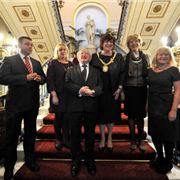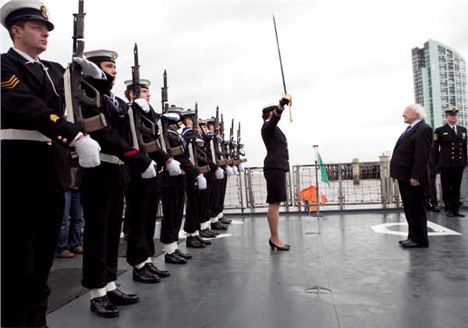LIVERPOOL'S standing as "the most Irish of British cities" got a boost this week when Irish President Michael D Higgins flew in to strengthen ties with the Irish community.
The highlight of his visit was the John Kennedy Lecture, at the University of Liverpool, where he spoke on "Liverpool and its Irish Migrants". It followed a visit to the Town Hall, where he was greeted by Lord Mayor Sharon Sullivan, and the laying of a wreath at the St Luke’s bombed-out church, at the memorial to those who fled Ireland for Liverpool at the time of the Great Famine.
Yesterday, President Higgins and his wife, Sabina, presided at a reception on board the LE Eithne, an Irish naval vessel, to mark the local launch of "The Gathering", a venture designed to encourage people to holiday in Ireland next year.
He urged his listeners "to tread in the footsteps of some of the most famous writers in the world, such as Beckett, Joyce, Yeats, Shaw, Wilde and Heaney", to bring their children to see a game of hurling or walk and cycle in the beautiful green hills.
He underlined the contribution the Liverpool-Irish had played in Irish history, with a nod to Liverpool-born "Big Jim" Larkin, a key figure in the development of Irish trade unions and a founder of the Irish Labour Party a century ago.
He also talked about the 1.3 million Irish who came through Liverpool in three years during the famine period, many of whom subsequently died on board ships to the US and Canada.
 Knees upPresident Higgins also spoke of the contribution of the Liverpool-Irish to football, referring in particular to John Aldridge, who had played for both Liverpool and Tranmere, and Kevin Sheedy, welcoming the latter's return to work with the Everton Academy, after a serious illness.
Knees upPresident Higgins also spoke of the contribution of the Liverpool-Irish to football, referring in particular to John Aldridge, who had played for both Liverpool and Tranmere, and Kevin Sheedy, welcoming the latter's return to work with the Everton Academy, after a serious illness.
He was greeted on arrival on the vessel, berthed at Liverpool Cruise Terminal, by Commander Brian Fitzgerald and met by a guard of honour of sailors, while Mark Henry of Tourism Ireland highlighted some of the events which would form part of The Gathering.
The Irish Ambassador, Bobby McDonagh, said that Liverpool was "the most Irish of British cities" and said that those who came to the city in the Famine years would marvel, not only that Ireland was now independent, but also at its warm relationship with the United Kingdom.
Later, at St Michael's Irish Centre, a reception was held for groups associated with the Irish community. These included Irish Community Care Merseyside as well as GAA clubs and groups associated with the Irish language and music.
Recalling that many of the early Irish settlers could not speak English, he spoke of the need for people in today's Ireland to listen to the stories of migrants from Africa and Asia, just as they would like others to listen to stories of Ireland.















